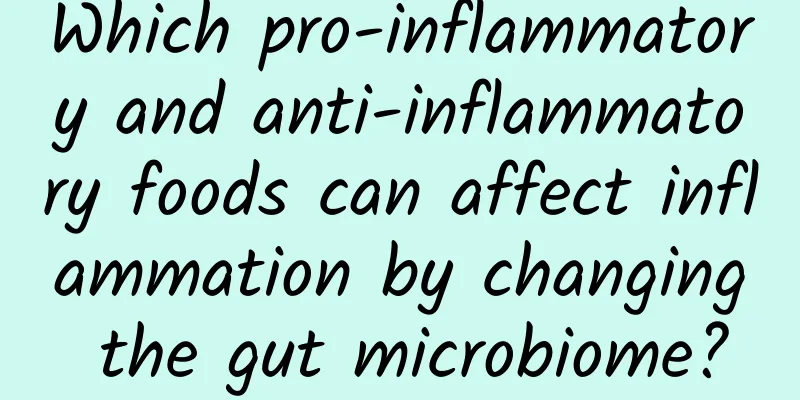Which pro-inflammatory and anti-inflammatory foods can affect inflammation by changing the gut microbiome?

|
As one of the largest immune organs in the human body, approximately 70% of the immune system is located in the intestine. The types and quantities of intestinal microorganisms directly affect the state of intestinal inflammation. When the intestinal microbiome is in balance, it helps maintain and enhance immunity and resist inflammation; If out of balance, it may trigger and aggravate inflammation and increase the risk of a variety of inflammation-related diseases, such as diabetes, arthritis, heart disease, and systemic lupus erythematosus. Recently, a study published in Gut showed that: 1. Diets rich in animal foods, processed foods, alcohol, and sugar are associated with an increase in the number of pro-inflammatory microbes; 2. A diet rich in plant foods is associated with an increase in the number of microorganisms with anti-inflammatory effects. Dietary methods to suppress inflammation: 1. Long-term diet rich in beans, vegetables, fruits and nuts; 2. The intake of plant-based foods is higher than that of animal-based foods; 3. Prefer low-fat fermented dairy products and fish; 4. Avoid drinking strong alcoholic beverages and soft drinks; 5. Avoid processed, high-fat meats. These practices have the potential to prevent intestinal inflammation via the gut microbiota. 》Eating more fruits and deep-sea fish increases the abundance of Faecalibacterium prausnitzii in the intestines; 》Eating more nuts, deep-sea fish, vegetables, whole grains and beans will increase the abundance of Roseburia hominis. Coffee drinking is associated with an increase in the relative abundance of Oscillibacter. 》Consumption of fermented dairy products, such as buttermilk and yogurt, was strongly associated with increased abundance of Bifidobacterium, Lactobacillus, and Enterococcus. These gut microbiomes also have anti-inflammatory effects. Pro-inflammatory diet: Foods with pro-inflammatory properties promote “bad” gut bacteria. These foods include: 1. Animal products 2. Processed foods, fast foods such as chips and soda 3. Strong alcoholic beverages 4. Sugar and similar foods. 》Processed foods and animal foods promote bacteria from the phyla Firmicutes and Ruminococcus, increasing the risk of inflammation. 》Consumption of sugary foods, including sugary drinks and candies, is associated with a decrease in the abundance of Faecalibacterium prausnitzii. 》The consumption of fast food such as meat, French fries, mayonnaise and soft drinks was associated with an increase in the abundance of some "unfriendly" gut microbiomes, including Clostridium bolteae, Coprobacillus and Lachnospiraceae. In the absence of dietary fiber, these bad bacteria mentioned above can enter the mucus layer of the intestine, leading to erosion of intestinal integrity. Finally, whether you are a healthy person or a patient with ulcerative colitis, Crohn's disease, or irritable bowel syndrome, you should do the following in your daily diet: 1. Increase the intake of beans, vegetables, fruits and nuts, so that plant-based foods account for more than animal-based foods; 2. At the same time, increase the amount of low-fat fermented dairy products and fish, and avoid drinking alcohol; 3. Reduce the consumption of processed foods and sugary drinks; 4. Long-term persistence; These practices can promote the growth of anti-inflammatory microbiota in the intestines, improve intestinal and overall health, and reduce the risk of inflammation-related diseases. Reminder: This article is intended to introduce the progress of biomedical and health research, not to recommend treatment plans, and cannot guide disease treatment. If you need treatment plan guidance, please go to a regular hospital for treatment. References Laura A Bolte, et al.,(2021). Long-term dietary patterns are associated with pro-inflammatory and anti-inflammatory features of the gut microbiome. Gut, DOI: http://dx.doi.org/10.1136/gutjnl-2020-322670 |
>>: What is the meaning of stress in psychology? What are the tasks of psychology?
Recommend
Why do gout attacks become more frequent after starting to lower uric acid?
Nowadays, people’s lifestyle and diet are relativ...
What causes low back pain during pregnancy
Changes in hormones in the body during pregnancy ...
Causes of abdominal pain after IUD insertion
IUD insertion is a common contraceptive measure u...
Diarrhea after egg retrieval
Eggs are produced only by the female uterus. Some...
How to relieve stomach pain during menstruation
Menstruation is a big ordeal for every girl, incl...
What should pregnant women pay attention to when their placenta is low
Girls all hope to have a baby with their lovers a...
Can I get pregnant during my period?
Female pregnancy is the combination of sperm and ...
What is the cause of yellow and sour leucorrhea?
For women, secretions have a certain protective e...
What is the scientific way for women to lose weight?
As people's living standards continue to impr...
What to do if a man loses hair after washing his hair
When we wash our hair, we usually feel obvious ha...
Can pregnant women have sex when they are 5 months pregnant?
There are many common problems in a woman's s...
What are the hazards of high blood lipids? What should you pay attention to when you have high blood lipids?
As our living standards improve, our health statu...
Do you know the reason why the vagina is white?
The color of the vagina determines its health. Th...
Can I drink coffee during confinement?
Confinement after childbirth is a tradition uniqu...




![[Popular Science Lecture] Understand the risk factors of myocardial infarction and share diet, exercise and drug management suggestions for preventing myocardial infarction](/upload/images/67f195d21ea90.webp)




